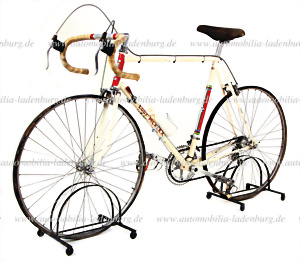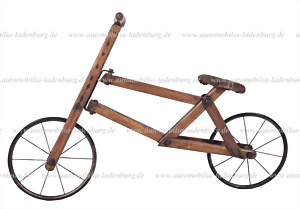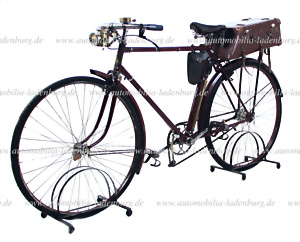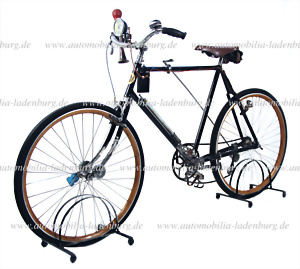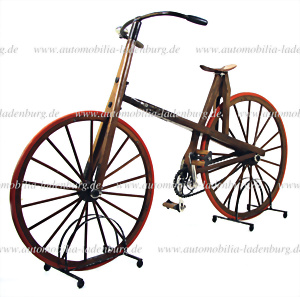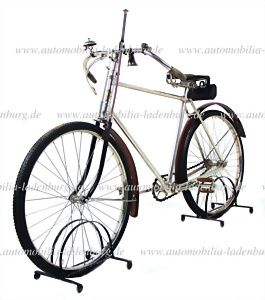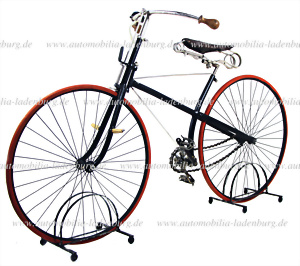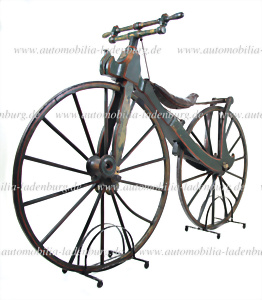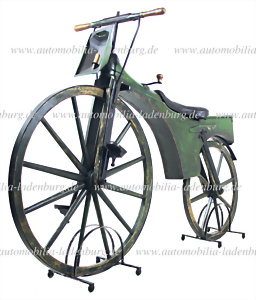Automobilia Auction November 2025
Automobilia Auction November 2025 - Page 30/44 - sorted by item number
No. 1577 CYCLE-L. BOTHY NAMUR-BELGIUM
1923, men's sports bike BSA with wooden spoke wheels with wooden mudguards, original paintwork, pedal hooks, Engelbert-Extra clincher tires, torpedo hub with chain tensioner, 28 inch, rubber broken from tire
Limit: 200,00 €
Sold: 900,00 €
No. 1578 DE DION-BOUTON PUTEAUX
1930, men's bicycle from France with wooden spoke wheels, frame no. 21136, pannier rack with Rako case, tool bag, Leko dynamo with wheel sun lamp, original paintwork, 28 inches - De Dion-Bouton was a French manufacturer, known primarily for automobiles and vehicles, but also for high-quality bicycles and motorcycles
Limit: 200,00 €
Sold: 300,00 €
No. 1579 DÜRKOPP
1920, ladies' cardan wheel, chainless drive shaft transmission, original paintwork, dynamo lighting, Dürkopp bell, tool bag, basket bag on the luggage carrier and handlebars, 28 inches - Dürkopp was founded in Bielefeld and was an important manufacturer in the late 19th and early 20th century in the fields of sewing machines, bicycles and later motor vehicles
Limit: 350,00 €
Sold: 950,00 €
No. 1580 JOSÈ MEIFFRET
1951, world record bike by José Meiffret, 1951 - José Meiffret (1913-1983), French racing cyclist, with the bike offered here he reached a top speed of 175.609 km/h on October 13, 1951 behind a 4.5-liter Talbot racing car, driven by Formula 1 driver Yves Giraud-Cabantous.Steering head plate "Cycles YVARS, Paris", frame lettering "MYVARS", chainring with 130 teeth (diameter 52 cm / 20.5 inches), gear ratio 130/12 → 22 meters per pedal revolution, rim brake Super-Dural-LAM, saddle Laminargent-Paris, wooden rims with tubular tires, pedal crank Stronglight, no gears, high-flange front wheel 53 cm (21 inches), rear wheel 62 cm (24.5 inches) - Meiffret set a total of 13 speed records, including 104.875 km/h behind a BMW motorcycle on the Grenzlandring Mönchengladbach in 1950 and 204 km/h behind a Mercedes 300 SL on the Freiburg autobahn in 1962...
Limit: 15,000,00 €
Sold: 28,000,00 €
No. 1581 EDDY MERCKX
Tour de France 1970, original preserved winning racing bike of Eddy Merckx (born 17.06.1945, Meensel, Belgium) and racing bike of the Faema-Faemino team, Tour de France 1970 - Merckx is considered one of the greatest cyclists in history: 5× Tour de France winner (1969,70,71,72,74), 111 days in the yellow jersey, 34 stage victories, 5× Giro d'Italia, 2× Vuelta a España, 3× road world champion (1969,71,74), world hour record 1972, over 525 victories in total. Frame builder: Giuseppe Pelàs, tubular steel frame made of Reynolds 753, equipped with Campagnolo and Cinelli components, original tubular tires, twelve-speed gears - The bike manufacturer De Rosa was known in Italy for precisely manufactured racing bikes and worked with top riders such as Merckx.
Limit: 15,000,00 €
Sold: 15,000,00 €
No. 1582
1900-1920, children's wooden balance bike with simple frame construction, wooden spoke wheels and fixed handlebars, handlebar height 60 cm, length 85 cm, original condition
Limit: 200,00 €
No. 1583
1900-1920, children's wooden balance bike, handlebar height 60 cm, length 85 cm
Limit: 150,00 €
No. 1584
1940, children's sheet metal tricycle with front wheel pedal drive, handlebar height 50 cm, length 50 cm
Limit: 100,00 €
No. 1585
1950, children's tricycle "Torpedo", with bell and front wheel pedal drive, handlebar height 55 cm, length 60 cm, in original condition
Limit: 100,00 €
Sold: 100,00 €
No. 1586
1900-1920, children's tricycle with height-adjustable saddle, front-wheel pedal drive and original paintwork
Limit: 150,00 €
Sold: 160,00 €
No. 1587 WEILWERKE AG
1922, Torpedo youth bike with stamped brake, wooden deco rims and original paintwork, 24 inches - Weilwerke AG produced bicycles under the Torpedo brand name from the early 1920s and was one of the best-known manufacturers in the Frankfurt area
Limit: 200,00 €
Sold: 200,00 €
No. 1588 FRANÇAISE D'ARMES ET CYCLES DE ST. ETIENNE
1925, "Hirondelle" Retro-Direct bicycle, with 2-speed "Retro-Direct" derailleur gears (1st gear = pedaling backwards for uphill sections, 2nd gear = pedaling forwards for flat sections), pedal hook, child's seat, bicycle lock, tool bag, original paintwork, 28 inches - the Manufacture Française d'Armes et Cycles de Saint-Étienne was founded in 1885 and sold bicycles under the Hirondelle brand name
Limit: 250,00 €
Sold: 700,00 €
No. 1589 PLUME VAINQUEUS GENT
1921, ladies' bicycle PDS with chain guard, rim brake on bottom bracket, tool bag, child seat, original paintwork, 26 inches - The Plum bicycle store in Ghent (Belgium), originally founded in 1910 as "PDS" by Pol Desnerck, later became known as Plume Vainqueur and was active in Belgian cycling for decades
Limit: 250,00 €
Sold: 250,00 €
No. 1590 CYCLE JB LOVELY PARIS
1932, men's sports bike with sprockets right and left on the rear wheel, pedal hook, 3-speed Oscar Egg Super-Champion derailleur (first derailleur to be approved for the Tour de France in 1937), original paintwork, 28 inches
Limit: 250,00 €
Sold: 450,00 €
No. 1591 FN - FABRIQUE NATIONALE D'ARMES
1910, ladies' cardan bicycle from Belgium, with chainless drive shaft transmission, original paintwork, dynamo lighting, Dürkopp bell, tool bag, basket bag on the pannier rack and removable handlebars, 28 inches - The Fabrique Nationale in Herstal (Belgium) began manufacturing bicycle frames in 1895 and complete bicycles from 1898 onwards
Limit: 300,00 €
Sold: 850,00 €
No. 1592 BIRMINGHAM SMALL ARMS COMPANY / BSA
1931, men's bicycle with fork suspension Brevet S.G.D.G.P. P.d.A, wooden rims in aluminum rim, pedal hook, 3-speed Pedor derailleur, gearshift on the top tube, compression spring rear brake on the bottom bracket, saddle bag, original paintwork, 28 inches - BSA (Birmingham Small Arms Company) was a British industrial group that manufactured bicycles from 1880 and later also motorcycles, weapons and other products
Limit: 250,00 €
Sold: 450,00 €
No. 1593
1888, wooden cross frame bicycle with wooden spoked wheels, wooden rims, solid rubber tires, neck steering, four BSA patent ball bearings no. 5991 in the bottom bracket and on the spoked wheels, front wheel 68 cm (27 inches), rear wheel 70 cm (28 inches)
Limit: 1,500,00 €
No. 1594 HURTU PARIS
1895, Safety safety bicycle (Rover model) with nickel-plated diamond frame, pneumatic wheels with tangential spokes, original saddle, spoon brake, whip holder with whip, wooden mudguards, front wheel 62 cm (24 inches), rear wheel 62 cm (24 inches) - Hurtu was a French manufacturer of mechanical devices, founded in Paris in 1880, which initially specialized in sewing machines and later in bicycles and automobiles
Limit: 450,00 €
Sold: 2,200,00 €
No. 1595
1898, cross rover with tubular steel frame, radial spoke wheels with solid rubber tires, spoon brake, original saddle, footrest, pedals not original, front wheel 74 cm (30 inches), rear wheel 75 cm (30 inches)
Limit: 2,000,00 €
Sold: 2,000,00 €
No. 1596 PEUGEOT
1909, cardan wheel, chainless men's bicycle with open cardan shaft drive, child seat, 28 inches - Peugeot began producing bicycles as early as the 1880s and quickly developed into one of the leading French manufacturers
Limit: 500,00 €
Sold: 1,200,00 €
No. 1597 THE STERLING BICYCLE & CO
1890, bicycle with Sterling Bicycle & Co. Chicago no. 4387 on the handlebars, tubular steel diamond frame, spoon brake, tangential spoke wheels with solid rubber tires, whip holder with whip, curved seat tube, original saddle, chain tensioner on the rear wheel - one of the first production bicycles with Dunlop pneumatic tires, front wheel 65 cm (26 inches), rear wheel 65 cm (26 inches)
Limit: 1,000,00 €
Sold: 1,900,00 €
No. 1598 FN - FABRIQUE NATIONALE D'ARMES
1931, men's sports bike FN, with block chain, bottle cage with bottle, pedal hook, saddle bag, compressed air pump, 28 inch, original condition - The Fabrique Nationale in Herstal (Belgium) began manufacturing bicycle frames in 1895 and complete bicycles from 1898 onwards
Limit: 650,00 €
Sold: 1,200,00 €
No. 1599 MAGNAT & DEBON GRENOBLE
1912, men's bicycle with 3-speed gearbox in bottom bracket, shifting via shaft on top tube with turning of a shifting loop for gear selection (P = petite, M = medium, G = straight), wheel arch bell, battery-powered lamp, original paintwork, 28 inches - Magnat & Debon was a French manufacturer based in Grenoble, active from the early 1900s, which produced motorcycles and high-quality bicycles and was particularly known for technical innovations, including gearbox solutions and elegant frame shapes
Limit: 500,00 €
Sold: 1,300,00 €
No. 1600 NAUMANN
1910, men's sports bike with original paintwork, pedal hook, Continental tires, tower bell, Hercules wheel bell, stamp brake, triangular tool bag, 28 inches - The company Seidel & Naumann (Dresden) produced bicycles from around 1887 to 1938 and was the owner of the "Germania" brand, among others
Limit: 450,00 €
Sold: 750,00 €
No. 1601 FN - FABRIQUE NATIONALE D'ARMES
1910, men's cardan bicycle, chainless men's bicycle with encapsulated cardan drive via crankshaft, child's seat, original FN saddlebag, wooden mudguards, 28 inches - The Fabrique Nationale in Herstal (Belgium) began manufacturing bicycle frames in 1895 and complete bicycles from 1898 onwards
Limit: 500,00 €
Sold: 1,100,00 €
No. 1602 TRIUMPH
1922, men's bicycle with tool bag, saddle, wheel arch bell, stamped brake with Triumph lettering, pedal hook, wooden rims, SUK rear wheel lock and original paintwork, 28 inches - The Triumph-Werke Nürnberg AG was founded in 1896 as a German subsidiary of the British Triumph Cycle Co. Ltd. and produced bicycles, later also motorcycles
Limit: 250,00 €
Sold: 420,00 €
No. 1603
1893, wooden wheel with pedal crank and swing drive to the rear wheel, wooden frame and wooden spoke wheels with iron tires, sprung front wheel and saddle, original saddle, front wheel 66 cm (26 inches), rear wheel 87 cm (34 inches)
Limit: 1,200,00 €
Sold: 2,600,00 €
No. 1604 MAG-NIS-PARIS
1921, girls' bicycle with chain drive, saddlebag, bell, wheel diameter 52 cm, handlebar height 85 cm, length 140 cm
Limit: 250,00 €
No. 1605
1912, racing track bike with wooden spoked wheels and tubular tires, original paintwork, sprocket right and left on the rear wheel, pedal hook, 28 inch
Limit: 600,00 €
Sold: 600,00 €
No. 1606 WITTKOP-BIELEFELD
1935, rocker scooter, with name on the rubber mat of the footboard and on the nameplate of the handlebar, handlebar height 100 cm, length 130 cm, in original and functional condition - Wittkop from Bielefeld was a traditional German manufacturer of bicycle saddles and accessories, which also produced children's vehicles and scooters from the 1930s onwards
Limit: 100,00 €
Sold: 160,00 €
No. 1607
1900, children's wooden bicycle with pedal rear wheel drive, small front wheel, handlebar height 70 cm, length 120 cm, front wheel diameter 25 cm, rear wheel diameter 50 cm, in original condition
Limit: 250,00 €
Sold: 250,00 €
No. 1608
1950, small children's bike with chain drive, handlebar height 60 cm, length 90 cm
Limit: 100,00 €
Sold: 100,00 €
No. 1609
1903, children's wooden bike with chain drive and adjustable frame parts, handlebar height 80 cm, length 120 cm
Limit: 200,00 €
No. 1610
1890, children's wooden bicycle with chain drive and height-adjustable saddle, handlebar height 80 cm, length 120 cm, in original condition
Limit: 450,00 €
No. 1611 BRENNABOR
1896, cross-frame art and artist's bicycle with triangular wooden wheels and solid rubber tires, tubular steel frame with neck steering, frame no. 71 on upper and no. 300 on lower frame, Brennabor lettering on front and rear hub, front wheel 20 inches, rear wheel 20 inches, length 150 cm, handlebar height 90 cm - The Brennabor works from Brandenburg an der Havel (founded in 1871) were one of the most important German bicycle and later also motorcycle and automobile manufacturers of the time
Limit: 650,00 €
Sold: 1,600,00 €
No. 1612 MICHAUX
1864, original pedal crank bicycle with serial number 1762, wrought iron frame, block brake by means of a cable to the rear wheel, wooden spoke wheels with iron tires, bronze plain bearings, original saddle on leaf spring suspension, acorn-weighted pedals and handlebar bag, Front wheel 108 cm (42 inches), rear wheel 75 cm (30 inches), length 185 cm, handlebar height 140 cm - Michaux et Cie was founded in Paris in 1868 by Pierre Michaux together with the Olivier brothers and is considered the first company to mass-produce pedal-driven velocipedes
Limit: 1,500,00 €
Sold: 3,100,00 €
No. 1613
1870, wooden pedal crank bicycle with saddle on leather straps, wooden wheels with iron tires, wooden pedals, rear wheel brakes, bronze plain bearings and non-original handlebars, front wheel 100 cm (39 inches), rear wheel 90 cm (35 inches), length 190 cm, handlebar height 130 cm
Limit: 3,000,00 €
Sold: 2,225,00 €
No. 1614
1872, Boneshaker with wrought-iron frame, original saddle and bag holder on leaf spring, wooden spoked wheels with iron tires, original lines and rear wheel brake via cable, front wheel 83 cm (33 inches), rear wheel 70 cm (28 inches), length 160 cm, handlebar height 120 cm
Limit: 1,500,00 €
Sold: 1,800,00 €
No. 1615
1830, wheel as a steerable running machine made of wood with footrest, wooden wheels with iron tires and steering via handlebars on the front wheel, wooden handles and non-original rear wheel, front wheel 70 cm (28 inches), rear wheel 70 cm (28 inches), length 160 cm, handlebar height 100 cm
Limit: 2,000,00 €
No. 1616
1877, high wheel with upturned handlebars, tubular steel frame, Brozen hub, thick spokes on wooden rims with iron tires, original saddle with broken wood on leaf spring and open steering head, front wheel 40 inches
Limit: 1,000,00 €
Sold: 1,200,00 €
No. 1617
1870, pedal crank bicycle based on the model of the German instrument maker Philipp Moritz Fischer from Schweinfurt, who was the first in Germany to attach pedals to the front axle (replica), with wooden box frame and cable brake, front wheel 95 cm (37 inches), rear wheel 70 cm (27 inches), length 180 cm, handlebar height 130 cm
Limit: 1,000,00 €
Sold: 1,200,00 €
No. 1618
1818, Draisine running wheel (old replica) based on the Karlsruhe model by Baron Karl-Friedrich Drais von Sauerbronn (1785-1851), with wooden frame and height-adjustable saddle, wooden spoke wheels with iron tires and balancing board, front wheel 65 cm (25 inches), rear wheel 65 cm (25 inches), length 180 cm - The original was presented by Karl Drais in Mannheim in 1817 and is considered to be the world's first two-wheeled, steerable means of transportation. This so-called "running machine" marked the beginning of bicycle history and later became known as the "Draisine"
Limit: 1,500,00 €
Sold: 3,200,00 €
No. 1619 ADLER
1914, military men's bicycle with spare tires made of steel coil springs, enclosed in steel band, stamped brake and frame no. 63152, equipped with military equipment: rifle, lamp, water bottle, sabre, blanket, binoculars, cutlery box, spade, coffee can, pannier bag, top tube military bag, gas mask can, ice axe hood and rucksack, 28 inches - the Frankfurt company Adler was founded in 1880 and quickly developed into one of the leading German manufacturers of bicycles and later also motorcycles and automobiles. Even before the First World War, Adler manufactured robust and technically high-quality military bicycles designed for use by the German army
Limit: 2,500,00 €
Sold: 2,500,00 €
No. 1620 CHARLES BLONDIN
1877, artist's penny-farthing and self-made by the French tightrope walker and acrobat Charles Blondin (1824-1897), with tubular steel frame, bronze hub, hollow rims for rope support, mounting bracket on the fork (thus no steering), front wheel 40 inches, rear wheel 18 inches, weight 50 kg, original condition - Blondin used this penny-farthing to cross Niagara Falls on a 300-metre-long rope, while a man hung on a trapeze below the penny-farthing to keep his balance
Limit: 3,000,00 €
Sold: 3,000,00 €
No. 1621
1820, wheel as steerable running machine made of wood with body in the shape of an animal head (snake), horse saddle on leather straps, steering, wheels and fork not original, front wheel 70 cm (28 inches), rear wheel 70 cm (28 inches), length 160 cm, handlebar height 120 cm
Limit: 2,800,00 €
Sold: 4,600,00 €
No. 1622
1872, Velociped tandem "Caroussel", with wrought-iron frame, 36-inch all-metal wheels, bronze bottom bracket with freewheel, bronze handlebars and original saddle on leaf spring suspension, weight 67 kg, front wheel 92 cm (36 inches), rear wheel 92 cm (36 inches), length 200 cm, handlebar height 125 cm
Limit: 3,000,00 €
Sold: 3,000,00 €
No. 1623 TRICYCLE ROYAL-SALVO
1877, designed by James Starley (1831-1881), commissioned by Queen Victoria, the British "father of the bicycle". Steel tricycle with chain drive, chain tensioner and differential on the left side, bronze hub with radial spokes and solid rubber tires, steering by turning a split handle with the right hand on the front wheel via gear wheels, leather belt, drum brake, drive rod with pedals, original angled spring saddle, chain bearing B.S.A. Patent 5991, front wheel 44 cm (17 inches), rear wheel 115 cm (45 inches), length 170 cm, width 93 cm, handlebar height 115 cm - the Royal Salvo Tricycle was developed by James Starley in Coventry. Starley is regarded as the inventor of the modern bicycle and was instrumental in the development of the differential gear and chain drive. The "Royal Salvo" was one of the first tricycles with this technology and was manufactured around 1877 especially for the royal household
Limit: 4,500,00 €
Sold: 4,500,00 €
No. 1624
1856, original Padamotiv tricycle, with double rear wheel drive via the feet and the right hand, which also operated the brakes, wrought iron frame, wooden spoke wheels with iron tires, original saddle and carriage lamp, weight 58 kg, Front wheel 90 cm (35 inches), rear wheel 95 cm (37 inches), length 240 cm, width 100 cm, handlebar height 128 cm - The Padamotiv tricycle is one of the early forerunners of pedal-powered vehicles, even before the Michaux pedal-powered velocipede became established. They are regarded as the link between the early walking machines and the first real bicycles
Limit: 2,500,00 €
Sold: 2,600,00 €






